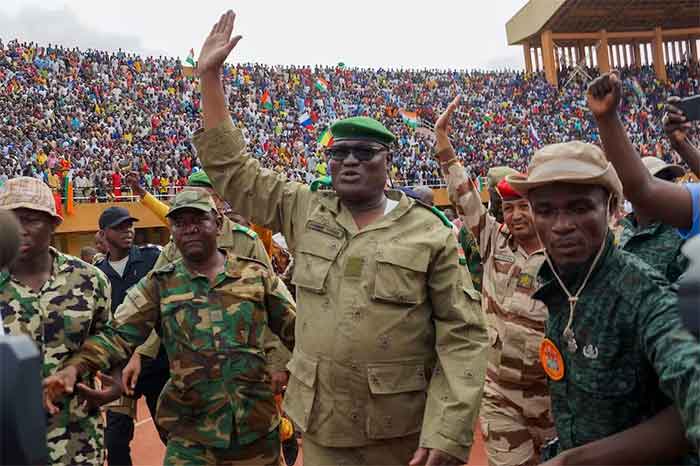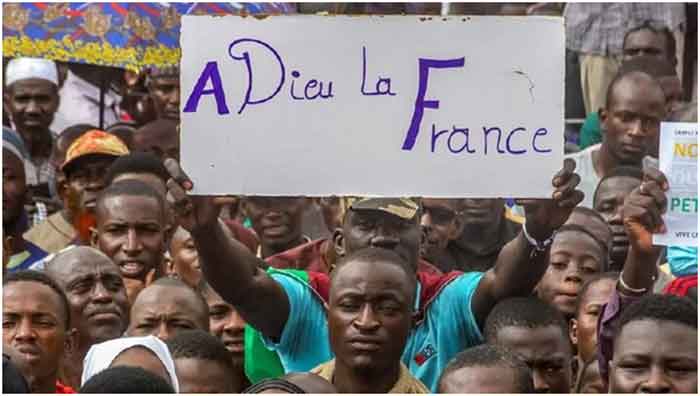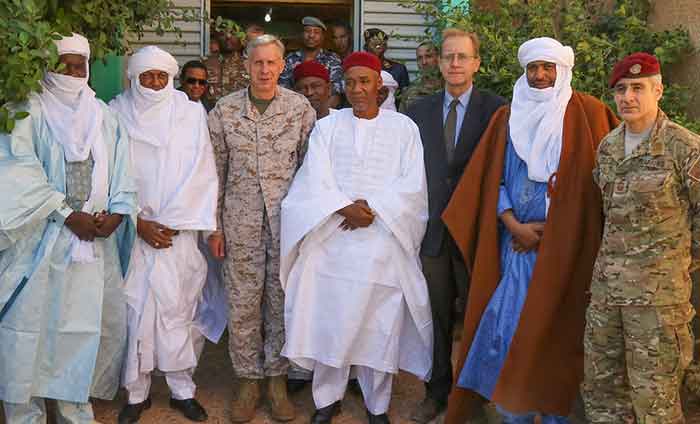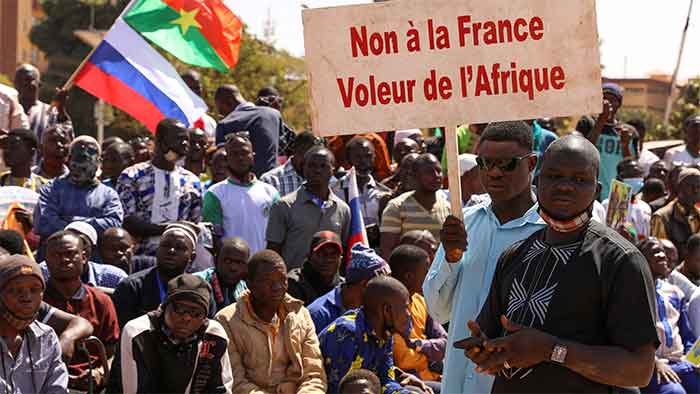
France will back any military action by the 11-member Economic Community of West African States (ECOWAS) in Niger to restore the rule of ousted leader Mohamed Bazoum, French President Emmanuel Macron has said.
Macron made the comment in response to the Expulsion of French Ambassador Sylvain Itte from Niamey by the new military government that seized power in a coup last month.
The Nigerien Foreign Ministry said on Friday that the envoy had 48 hours to leave the country for refusing to meet with the new military rulers and for “other actions of the French government contrary to the interests of Niger.”
Speaking to diplomats in Paris about French foreign policy on Monday, Macron stated that, despite the coup leaders’ order, the ambassador would remain in Niger.
“France and its diplomats have faced particularly difficult situations in some countries in recent months, from Sudan, where France has been exemplary, to Niger at this very moment, and I applaud your colleague and your colleagues who are listening from their post,” Macron said.
The West African regional bloc, ECOWAS, has been attempting to negotiate with Niger’s coup leaders, but has warned that, if diplomatic efforts fail, troops would be sent to Niamey to restore democratic rule.
Macron called Bazoum’s decision not to resign, which has kept him under house arrest since the July 26 coup, “courageous” on Monday.
France would not change its stance on condemning the coup and supporting Bazoum, the French president insisted, emphasizing that the ousted leader had been democratically elected.
“I think our policy is the right one. It is based on the courage of President Bazoum, and on the commitments of our ambassador on the ground who is remaining despite all the pressure, despite all the declarations made by the illegitimate authorities,” said the French President.
Meanwhile, hundreds of supporters of the military rulers reportedly rallied on Saturday near a French military base in the capital, Niamey, calling for the removal of the soldiers, while accusing Paris of meddling in the country’s affairs.
France still has 1,500 soldiers in its former French colony, its last remaining ally in the Sahel region in the fight against jihadist insurgencies.
Earlier this month, Niger’s new rulers announced the cancellation of five military treaties with France. However, France insisted on carrying out the cooperation agreements, claiming they were signed with the country’s “legitimate authorities.”
Niger Expels French Ambassador
Earlier media reports said:
The military government of Niger on Friday gave French Ambassador Sylvain Itte 48 hours to leave the country. The Nigerien Foreign Ministry justified the decision by Itte not responding to their invitation to a meeting and “other actions of the French government contra the interests of Niger.”
The ambassador’s expulsion comes a month after the military of the former French colony, led by Brigadier General Abdourahamane Tchiani, ousted President Mohamed Bazoum. In response, the ECOWAS sanctioned Niger and threatened a military intervention to “restore democracy.”
Guinea, Mali, Burkina Faso
Guinea declined to go along with the sanctions, while neighboring Mali and Burkina Faso said they would consider such an intervention an act of war against them. Late on Thursday, Niger authorized the two neighbors to come to its defense should ECOWAS invade.
“The three countries have agreed to grant each other facilities for mutual assistance in matters of defense and security in the event of aggression or terrorist attacks,” said a joint statement by their foreign ministries.
Malian Foreign Minister Abdoulaye Diop and his Burkinabe colleague Olivia Rouamba also condemned the “illegal, illegitimate, and inhumane” sanctions imposed on Niger by ECOWAS and the West African Economic and Monetary Union (UEMOA).
Omar Alieu Touray, the ECOWAS Commission president, told AP that the sanctions have resulted in “serious socio-economic crises” in the country, but were “for the interest of the people of Niger.”
The ECOWAS has repeatedly announced final plans for a military intervention, while continuing to send diplomatic missions to Niamey. On Thursday, a delegation of Islamic leaders was dispatched to Niger by Nigerian President Bola Tinubu, who also chairs the bloc.
Earlier this week, General Tchiani outlined a proposal to return to civilian rule that would take “no longer than three years,” but warned neighbors and France not to interfere in Niger’s internal affairs.
The ECOWAS rejected the offer, demanding the immediate reinstatement of Bazoum. Touray told AP on Friday that the military option was “still on the table.”
Algeria Rejects French Request To Use Airspace For Niger Operation
A media report said:
Algeria has turned down a request from France to fly over its airspace for a military operation in Niger, several media reports suggested on Tuesday, citing the North-African nation’s state radio.
Algerian national radio reported late on Monday that it had learned from sources that France was planning a strike against Niamey’s new military rulers if they did not release Bazoum, who has been held in detention since July 26.
“Faced with Algerian refusal, France turned to Morocco, asking for authorization to pass its military planes through its airspace,” state radio said, according to the Nova News Agency.
France, which has some 1,500 troops in its former colony Niger, has been accused by the coup leadership of plotting to intervene militarily to restore the ousted president’s rule.
The French foreign ministry denied any intention of armed intervention in the West African country but has repeatedly stated that it supports the efforts of the West African regional bloc ECOWAS, which has threatened to use force to reverse the coup.
“France’s joint defense staff denies making a request to fly over Algerian territory,” a source in the French army told Reuters.
ECOWAS said on Friday that it has decided on a date for sending troops into Niger if diplomatic efforts at Bazoum’s restoration prove unsuccessful.
Benin, Ivory Coast, and Nigeria have all expressed willingness to contribute troops to the bloc’s mission to restore democratic order in Niger.
Earlier this month, Algerian President Abdelmadjid Tebboune raised concerns about an armed response to the crisis in Niamey, which he fears “could ignite the whole Sahel region.” He added that Algeria would not use force against its neighbors.
In a statement on Saturday, the Foreign Affairs Ministry of Algeria insisted on a peaceful restoration of democratic order, opposing the possible use of an ECOWAS “standby force” against the military leaders in Niger, saying military interventions “have brought more problems than solutions.”
African Union
The African Union (AU) warned on Tuesday against any external interference in Niger, after suspending the country’s membership as punishment for the coup.
West African Sanctions Blocking Food And Aid From Reaching Niger
A Reuters report said on Thursday:
Thousands of trucks carrying food bound for Niger have been stuck for weeks at the Malanville crossing in northern Benin due to border closures and sanctions imposed on the new military government in Niamey,.
Benin’s Malanville checkpoint is said to be one of the busiest in West Africa, with a high volume of transit goods, including humanitarian aid products passing through into neighboring Niger.
Traffic at the crossing is reportedly at a standstill, with a line of loaded trucks stretching back 25 kilometers “from the muddy shores of the Niger River that marks the frontier.”
Some small traders are said to be using wooden boats to transport goods across the river into the country, evading border guards.
“We do not know if we have taken hostage or what,” a Nigerien driver told the agency, who said he had been stranded at the border with his cargo of sugar and oil for more than 20 days. “There is no food, there is no water, there is nowhere to sleep,” he added.
The ECOWAS restricted financial transactions and blocked entry into Niger from its member states in order to force the new military government to reinstate ousted president Mohamed Bazoum.
3.3 Million People Food-Insecure In Niger
The World Food Programme (WFP) warned last week that the blockade was “greatly affecting the supply of vital foods and medical supplies inti Niger,” where it claimed at least 3.3 million people were already “acutely food-insecure” prior to the coup.
Margot van der Velden, the UN food agency’s acting regional director for Western Africa, has urged “all parties to facilitate humanitarian exemptions, enabling immediate access to people in need of critical food and basic necessities.”
The WFP’s West African regional spokesperson, Djaounsede Madjiangar, has also told the media that about 6,000 tonnes of goods from the agency, including cereals, cooking oil, and food for malnourished children, are stuck outside Niger.
Businesses in the country’s southern neighbor, Nigeria, have expressed concern about the impact of the sanctions on cross-border trade. Some residents told the Associated Press that business owners have taken advantage of the border closure to raise the prices of goods.
Burkina Faso And Mali Shall Defend Niger
Niger’s new military government has signed an order authorizing Burkina Faso and Mali to send their defense and security forces to intervene on its territory in the event of an attack, the parties announced on Thursday.
The agreement was reached in Niamey when both Burkina Faso’s foreign minister, Olivia Rouamba, and her Malian counterpart, Abdoulaye Diop, paid a visit to the coup leader, General Abdourahamane Tchiani.
“The three countries have agreed to grant other facilities for mutual assistance in matters of defense and security in the event of aggression or terrorist attacks,” the foreign ministries said in a joint statement late Thursday.
Last month, the military governments of Mali and Burkina Faso warned African states and Western governments against intervening militarily in neighboring Niger.
Any such move would be considered a declaration of war against Bamako and Ouagadougou, the military rulers said in a statement.
Consultation Framework Of 3 Countries
Mali, Burkina Faso and Nifer have also announced the formation of a “consultation framework” and a “a joint secretatiat” to coordinate efforts to “deal with the multiple situations and challenges to which they are exposed.”
















































